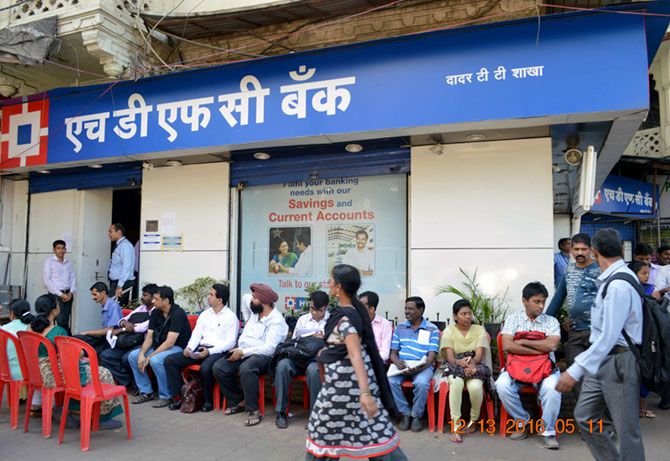'We asked them to withdraw these instructions immediately.
'We said, "If you don't withdraw, we are going to give a call that from tomorrow officers will totally boycott these instructions".'
 On Wednesday, December 21, the Reserve Bank of India withdrew its previous directive that required deposits above Rs 5,000 in old currency notes be justified to two bank officers.
On Wednesday, December 21, the Reserve Bank of India withdrew its previous directive that required deposits above Rs 5,000 in old currency notes be justified to two bank officers.
To understand the impact of this move, Business Standard's Nitin Sethi and Ishan Bakshi spoke to Harvinder Singh, general secretary, All India Bank Officers Confederation.
The RBI has withdrawn its previous directive that required deposits above Rs 5,000 in old currency notes to be explained to bank officers. What do you make of this?
We have been pleading before the RBI and the ministry of finance that instructions issued for the general public must be clear.
What's happening is that instructions issued through electronic media or notifications were reaching banks much later than they reach the people at large.
There was a time gap between the implementation of the instructions issued by the government/RBI because when the instructions reach banks, they will have to modify their systems so that the instructions are implemented.
For example, one instruction came that we will permit withdrawal up to Rs 2.5 lakhs per family for marriage expenses, subject to some conditions.
While these instructions were made viral during the mid of the day, banks received these only two days after.
In the intervening period, bank officers were facing a lot of problems.
Right from the day the policy of demonetisation was declared, we have been pleading with the RBI and the government to know the ground-level problems.
We said 'We will give you suggestions for smoother implementation.' But, no opportunity was given to us to air our views.
When these instructions were given on December 19, it was a surprise.
How can you thrust more responsibilities on bank officials which they are not supposed to undertake?
We undertake transactions only on trust. If a customer comes and deposits money, how can I question him?
During the past two days, we had to face a lot of difficulties. Many people questioned us.
What was expected from us was that two officers from a branch will record the statement of the depositor on camera, which will be kept for future. And you should be satisfied by the statement.
But who will decide? It will depend on individual understanding.
We cannot do any policing. Where is the issue of keeping an audit trail?
We sent a communication to the RBI in the morning, with a copy to the finance ministry, telling them clearly that this onerous responsibility cannot be entrusted with bank officers.
We asked them to withdraw these instructions immediately. We said, 'If you don't withdraw, we are going to give a call that from tomorrow officers will totally boycott these instructions.'
I'm nobody to question government policy. But we should have the power to implement and we need an assurance from the government that we will not be questioned in future.
Recent data suggest that roughly Rs 5 lakh crore of Rs 2,000 notes were with the RBI on November 8. Was there a problem in distributing them? Are there limits to the capacity of the banking system?
I'm not sure about how much currency was there with the RBI. The entire money in small denominations was released by the RBI, including soiled notes which were deposited by banks with the RBI for destroying.
Those notes were sent back to us for supply to customers.
How do you see the banking sector coping in the coming months?
The banking sector is going to suffer a lot.
For the past 50 days, we have been working on this. New funding has been stopped. My customers have informed me that their industrial and commercial activities have been substantially reduced. They have retrenched labour.
Economic activity has suffered. This will affect the paying capacity of borrowers.
Moreover, we have suffered opportunity costs.
Demonetisation has a cost, which we have to bear.
IMAGE: A queue outside a bank in Mumbai, December 13, 2016. Photograph: Arun Patil












 © 2025
© 2025